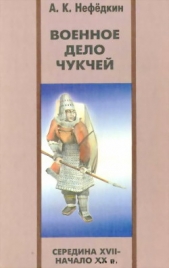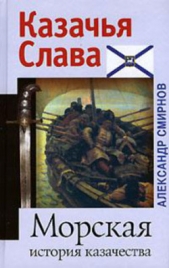Военное дело чукчей (середина XVII—начало XX в.)

Военное дело чукчей (середина XVII—начало XX в.) читать книгу онлайн
Настоящее издание рассматривает различные стороны военного дела чукчей на всем протяжении известной нам по письменным и другим источникам эпохи начиная со второй половины XVII в., когда чукчи впервые столкнулись с сибирскими казаками, и вплоть до начала XX в., когда еще происходили столкновения на почве кровной мести. Привлекаются сведения о соседних народах, азиатских и американских эскимосах, коряках и русских, что позволяет лучше раскрыть особенности военного дела чукчей. Книга является первым в историографии трудом, посвященным военному делу чукчей. Она будет полезна не только специалистам-этнографам, но и самому широкому кругу читателей, интересующихся военным делом.
Внимание! Книга может содержать контент только для совершеннолетних. Для несовершеннолетних чтение данного контента СТРОГО ЗАПРЕЩЕНО! Если в книге присутствует наличие пропаганды ЛГБТ и другого, запрещенного контента - просьба написать на почту [email protected] для удаления материала
Chukchi arranged different sorts of ambushes. In the first place, not numerous troop could was able to make sudden attack numerous enemy and obtain a successful result. Secondly, using feigned retreat was possible to ensnare enemy to entrapment and after all defeat it. Thirdly, started fight from battle-front and thereby not letting enemy to transfer any forces to another positions to gain the rear of the enemy and to encircle it.
Asiatic Eskimos and Coastal Chukchi did not raise special war dogs. However they were using same huskies during military operations of necessity. These animals had several functions. They were guarding dwelling doing ordinary dog's task. Dogs were intended to fight against men in case of attack or pursuit. Finally, considering the brute of predator, dogs were set on reindeer of enemy caravan, thereby taking away hostile transport and causing disorder among people, warriors attacked caravan and followed inevitable defeat of the riders.
Siege and defence. The Reindeer Chukchi, like any nomads at all, had no developed skills of erecting fortifications. They conducted military operations reckoning on surprise, even in spite of the tradition to declare war. The nomadic Chukchi made use of temporary dwelling only, both natural and artificial, as their campaigns were not counted on any long-term siege or defence because the natural conditions and lack of provision laid obstacles to them. They built fortified refuges only in case of serious menaces from the enemy. For erecting such just material at hand was utilized, viz. sledges, skins, stones, and turf. Inhabitants together with herds tried to leave and to find some safe place. If enemy superior in numbers Chukchi preferred to defend from fortifications. Otherwise, war ethos demanded to meet enemy face to face at the battlefield. The main method of defence was shooting arrows from fortifications with the object of inflicting great losses on foe and forcing them to retreat. The storm, a main method of the siege, could be directed both along the entire perimeter of hostile fortification and against their weakest points. No special siege equipment was at Chikchi's disposal. Its lack was replaced by a number of various tricks. Sometimes, when conducting siege operations the Chukchi could make use of big wooden shields to protect themselves form the Russian bullets. After enemy departure temporary fortifications were dismantled. The Maritime Chukchi and Eskimos erected stone fortifications on the heights dominating in area and waited there till the raid was over. Typical way to defend fortification was to slide down sledges laden with stones towards attacking enemy.
Naval warfare. Chukchi learned basic elements of seafaring from the Eskimos who were skilled in navigation. They used baydars as transport for the landing operations and not for the naval battle. There was no any difference between boat crew and passengers, both were soldiers. As well as in land warfare in naval expeditions Chukchi used natural conditions and time to make sudden attacks with small crew that helped to avoid undesirable losses. After the landing they began to operate as in usual land fight. In raid usually participated few baydars, however, exist record of large fleet of 100 baydars (the 18th century).
Religious realm of warfare. Making war man suffers from great psychological burden, Chukchi tried to reduce pressure with the help of narcotics. Probably, before fight they were eating flyagarics to reach light intoxication. Chukchi were not afraid of death, contrary they crave for it. This could be explained by their belief in afterlife and transmigration. This belief, however, did not exclude bearing of numerous amulets, which protected person from evil spirits. In the war was used special military magic: different kinds of spells, bedevil the enemy, sorcery in finding the right road or bringing fog or storm. Before fight Chukchi sacrificed some reindeer to the spirit of the area. In the 18th —beginning of the 19th century occurred human sacrifices, but in extraordinary situations.
Prisoners. Women and children were taken prisoners, as males including elders were annihilated. At the end of the 18th century coastal inhabitants had women slaves from Eskimos of Alaska who were captured in sea raids. These women married poor men or they were sold to the Reindeer Chukchi. For example, one slave for either twelve young female reindeer or ten female reindeer and two riding reindeer; children were even cheaper. Usually, there were just few slaves in kin group because of the ransom. Few days after the raid relatives were visiting victors and ransom prisoners. Sometimes there were cases when killer rendered his relative to the family of dead man, and who fulfil family needs instead of the killed. Chukchi did not yield themselves, they preferred to perish or commit suicide together with their families. Captured enemy was tortured. Probably, originally these tortures had a ritual nature but already in folklore they were explained by vengeance. Usually captured enemy leader was tortured because he was the one who was responsible for the damage and prejudice to Chukchi.
Translated by Anthon Xenophontov

























